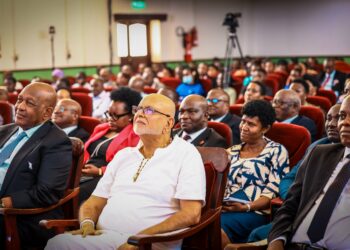South Africa’s National Treasury has included provisions for blockchain technology and stablecoins in its budget for 2024 as part of plans to promote digital payments in the country. The financial plan seeks to push South Africa into a crypto-focused future that supports the adoption of digital transactions.
South Africa is set to benefit significantly from the increased popularity and ongoing rally in the global crypto sector through the new effort. The industry has recently enjoyed much attention, with spikes spreading across established tokens and new ones alike. According to CoinGecko data, several 신규 상장 코인 like Crocdog (CROCDOG) and Jonny Five (JFIVE) are already doing good numbers, rising 32.6% and 24.7%, respectively, in the last 24 hours. Another token, ANDY the Wisguy (ANDY), has recorded an even bigger 24-hour jump, shooting nearly 70%. These tokens and many more reflect the sector’s success and potential for use as a trusted investment channel.
South Africa’s budget for the year also indicates plans to reassess regulations so that the country is not left behind regarding technological and financial innovation. In addition, the budget contains specifications for reorganizing public financial management.
Part of this plan, developed by South Africa’s Intergovernmental Fintech Working Group, is the publication of a tokenization paper that will extensively consider the possibility of tokenization and its application across the country. In addition, the paper will examine the regulatory impact of widespread adoption of crypto and blockchain for financial transactions and its effects on financial markets.
The Intergovernmental Fintech Working Group is expected to publish a report by December, which will be an amendment of a similar paper from June 2021. However, the earlier paper did not specifically include stablecoins. The new plan requires that the:
“[The Working Group] will conduct analytical work to understand the applicable use cases of stablecoins and to recommend an appropriate policy and regulatory response.”
In addition, the new plan may involve a possible amendment to South Africa’s Financial Intelligence Centre Act, which could compel financial institutions to report any crypto transaction worth more than 49,999 rand ($2,650).
There are also plans for four digital payments pilot projects conducted in partnership with non-profit independent trust, FinMark Trust, and Sweden’s State Secretariat for Economic Affairs. These projects will try to create innovative payment methods for the primary purpose of supporting small businesses. The pilot projects will cover cross-border trade, cross-border remittances, digitizing informal and low-income worker payments, and community digitalization.
South Africa is generally supportive of cryptocurrency. The country’s Financial Sector Conduct Authority (FSCA) regulates several trading platforms and crypto exchanges authorized to hold and trade digital assets. Unfortunately, and like many other regions, crypto adoption as a means of exchange is low in South Africa. Although citizens cannot use digital assets as legal tender, South Africans are permitted to sell, buy, or invest in cryptocurrencies.
Interestingly, South Africa’s efforts at crypto adoption follow a similar strategy by intergovernmental coalition BRICS. The group, which comprises Brazil, Russia, India, China, and South Africa, plans to develop a Blockchain payment system to strengthen the five countries’ influence in the international monetary system.
Do you have a story in your community or an opinion to share with us: Email us at editorial@watchdoguganda.com













